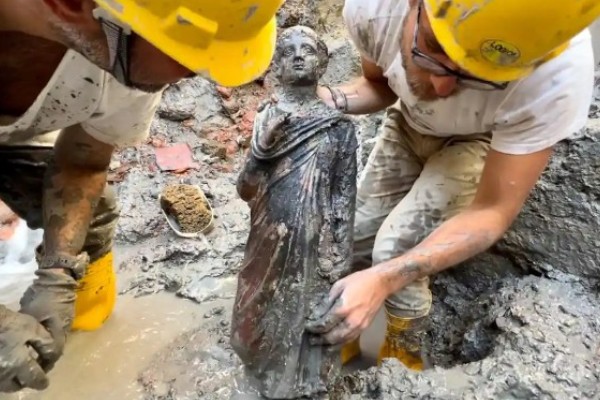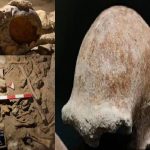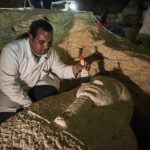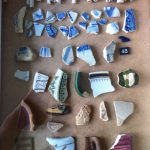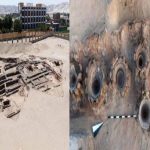An “amazing” collection of bronze statues preserved in mud and boiling water thousands of years ago was unearthed in a network of Etruscan baths in Tuscany.
The 24 partially submerged statues, which date back 2,300 years and have been dubbed the most significant find of its sort in 50 years, include a sleeping Efebi laying next to Hygeia, the goddess of health, who has a serpent coiled around her arm.
The statues were discovered during excavations in the ancient baths of San Cassiano di Bagni, near Siena. The current spa, which has 42 hot springs and is located near the old site, is one of the most famous tourist destinations in Italy.
[wonderplugin_video iframe=”https://youtu.be/FfZZQZisPJo” lightbox=0 lightboxsize=1 lightboxwidth=960 lightboxheight=540 autoopen=0 autoopendelay=0 autoclose=0 lightboxtitle=”” lightboxgroup=”” lightboxshownavigation=0 showimage=”” lightboxoptions=”” videowidth=600 videoheight=400 keepaspectratio=1 autoplay=0 loop=0 videocss=”position:relative;display:block;background-color:#000;overflow:hidden;max-width:100%;margin:0 auto;” playbutton=”https://www.tvcnews.tv/wp-content/plugins/wonderplugin-video-embed/engine/playvideo-64-64-0.png”]
The Etruscans are thought to have built these baths in the third century BC, and the baths, which contain fountains and altars, became more lavish during the Roman Empire, as emperors such as Augustus visited the springs for its health and therapeutic benefits.
Archaeologists discovered thousands of coins, as well as Etruscan and Latin inscriptions, in addition to the 24 bronze figures, five of which are almost a meter high. Visitors are supposed to have tossed coins into the baths as a sign of good health.
The remains, according to Massimo Osana, director general of museums at the Italian Ministry of Culture, are the most significant find of their sort since two full-size Greek bronzes of naked bearded warriors were discovered off the coast of Calabria near Riace in 1972. Ansa” is without a doubt one of the most significant bronze discoveries in the history of the ancient Mediterranean.
The historic spa was operating until the 5th century, when the ponds were covered with hefty stone pillars that archaeologists dismantled.
Since 2019, archaeologist Jacopo Taboli has been in charge of the excavations at San Casciano dei Bagni. Several items, including fertility figures thought to have been given to the gods as presents, were discovered at the site in August. Taboli, a professor of Foreigners at the University of Siena, described the latest discovery as “totally unusual.”
For 500 years before the establishment of the Roman Republic, the Etruscan civilization flourished in Italy, primarily in the central areas of Tuscany and Umbria. The Etruscans influenced Roman cultural and artistic traditions greatly.

